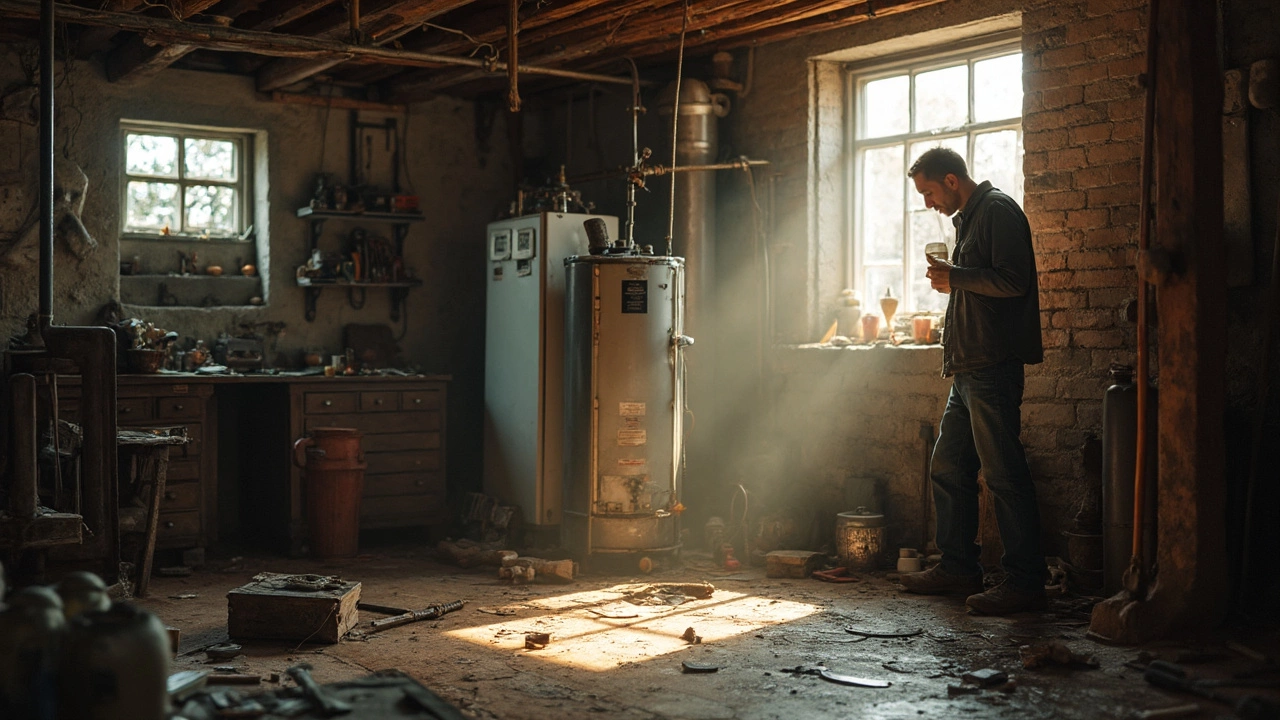
- 17 Mar 2025
- Gideon Thornton
- 0
Ever thought about how long your hot water heater is going to last? It’s one of those home appliances we don't really think about until it stops working. You might be wondering, can it really go on for 30 years? Well, truth is, it depends on a few factors, like the type of heater, how well it’s maintained, and good ol’ luck.
Generally, most water heaters have a life expectancy of about 8 to 12 years. However, some folks have successfully stretched that to nearly 30 years with the right care. Before you start planning to keep your heater for decades, let’s consider how to make sure it's staying in tip-top shape. Regular maintenance, like flushing out sediment and keeping an eye on the anode rod, can make a huge difference in how long your water heater sticks around.
- The Typical Lifespan of Water Heaters
- Signs Your Water Heater is Aging
- Maintenance Tips for Longevity
- When to Consider Replacing
- Innovations in Water Heater Technology
The Typical Lifespan of Water Heaters
Most folks don't think about their water heater until it starts acting up. But knowing the typical lifespan of your water heater can help you plan for maintenance and replacement costs.
Standard Water Heater Lifespan
For most traditional tank-type water heaters, you're generally looking at 8 to 12 years of reliable service. These appliances work pretty hard, heating up gallons of water every day, so it's no wonder they don’t last forever.
Tankless Water Heaters
On the other hand, tankless water heaters might give you a bit more mileage. With proper care, these can last around 20 years. They heat water on demand, so they experience less wear and tear than their tank-o-matic cousins.
Factors Affecting Lifespan
Let's break down a couple of things that could affect how long your heater will last:
- Maintenance: Regular upkeep, like flushing the tank to remove sediment, is key. Neglect it, and you might be shopping for a new one sooner than planned.
- Quality: Sometimes, you get what you pay for. Higher-end models might come with better parts and longer warranties.
- Water Quality: Hard water can speed up the deterioration of parts. Consider a water softener if your area's water is mineral-heavy.
Quick Stats
| Type of Water Heater | Typical Lifespan |
|---|---|
| Tank | 8-12 years |
| Tankless | 20 years |
Keeping tabs on these factors and performing regular checks can really extend the life of your heater. But when it's reaching the end of the road, you'll notice signs, like inconsistent water temperatures or odd noises. Those are your cues to start thinking about repair or replacement.
Signs Your Water Heater is Aging
Your water heater might not come with flashing warning lights, but it can still give you cues that it’s getting long in the tooth. If you've been relying on your heater without a second thought, it might be time to pay a little attention to what it's trying to tell you.
Less Hot Water than Usual
Remember when a shower would never turn cold halfway through? A diminishing supply of hot water can signal your heater's waning efficiency. This lost capacity often comes from sediment buildup, which reduces the heated water that's actually available.
Rusty Water
Notice brownish water coming out of the tap? While it could be your plumbing, it’s more likely that your water heater tank is corroding from the inside. If rust is setting in, it’s often a death knell for the heater, as these units aren’t designed to handle internal rust for very long.
Noises from the Unit
Popping, banging, or gurgling sounds aren't your water heater's friendly way of saying hello. These noises typically mean sediment has hardened inside the tank, making your heater work harder and eventually leading to damage.
Leaks Around the Heater
Spot any puddles around your heater? Even a small leak is cause for concern, usually pointing to a cracked tank or faulty connections. Any sign of leaking should not be ignored—it can escalate quickly into bigger (and wetter) problems.
| Warning Sign | Possible Issue |
|---|---|
| Less Hot Water | Sediment buildup |
| Rusty Water | Internal tank corrosion |
| Noises | Hardened sediment |
| Leaks | Cracks or faulty connections |
Being aware of these signs and addressing them early can help you avoid that icy surprise when you least expect it. So keep an eye—and ear—open for what your trusty water heater might be trying to tell you!

Maintenance Tips for Longevity
Turning your hot water heater into a long-term housemate isn’t rocket science, but it does take a bit of TLC. Let’s break down some straightforward things you can do to help extend its lifespan.
Flush the Tank Annually
Your heater's worst enemy? Sediment buildup. Over time, minerals like calcium and lime accumulate at the bottom, reducing efficiency. Flushing your tank once a year helps keep it clean. Just connect a hose to the drain valve, carefully let the water run out until clear, and you've turned good maintenance into a habit.
Check the Anode Rod
If you're wondering what an anode rod is, it's an underrated hero fighting rust inside your metal tank. These rods need a check-up every year; simply have a peek through the manufacturer’s instructions. If over six inches of its core steel wire is showing, or if it’s thinner than half an inch, it’s time for a replacement. This simple switch-up can save you from a corroded tank disaster.
Inspect for Leaks and Drips
A little peek here and there is key. Once in a while, inspect all around for leaks, moisture, or rust. Drips and leaks don’t just waste water, they waste a water heater’s life.
"Consistent and proper maintenance can double the natural lifespan of your water heater," says Jeffrey Hines, an engineer from Home Appliance Experts.
Keep Temperature in Check
Running your heater at lower temperatures not only slashes energy bills, but also saves the heater from wear. Generally, 120 degrees Fahrenheit is the sweet spot.
Use a Water Softener
Got hard water? It speeds up corrosion and scaling. A water softener could be your heater's best friend, prolonging its life and boosting performance.
Stick to these maintenance tips and you might just squeeze a few extra years out of your trusty appliance. Making sure it’s cared for can spell the difference between a 12-year lifespan and those elusive 30 years.
When to Consider Replacing
Deciding when to replace your water heater can be a tough call. So how can you tell it’s time to swap it out for a new one? Let’s break it down into a few key indicators.
Age of the Heater
First off, take a look at the age. If your water heater is pushing past the 10-15 year mark, the end might be near. Most traditional units, like tank-style heaters, usually don’t live more than 12 years.
Less Hot Water
Notice the hot water doesn’t last as long as it used to? This could mean your water heater can't heat as effectively due to sediment build-up or other wear and tear factors. It’s one of those signals you shouldn’t ignore.
Strange Noises
Does it sound like there’s a mini rock concert going on inside your heater? Those rumbling or banging noises are often a result of years of sediment build-up heating up and popping inside the tank, and it's a clear sign of aging.
Leaks or Rust
If you notice rusty water or any kind of leak, it’s a red flag. Water heater tanks can start to rust from the inside, eventually springing leaks that indicate it's time for a replacement.
Comparing Costs
Let’s talk numbers. Repairs can pile up and get pretty expensive. If you find yourself constantly calling for repairs, it might be cheaper in the long run to invest in a new unit. Here’s a quick look at estimated costs:
| Issue | Average Repair Cost |
|---|---|
| Thermostat Replacement | £100-£200 |
| Fixing a Leak | £200-£500 |
Sometimes, saving up for a new heater sooner can save you headaches and cash later.
Keep these signs in mind, and remember, a reliable water heater is crucial for your home’s comfort. It’s better to replace it before things get too cold for comfort!

Innovations in Water Heater Technology
Water heaters have come a long way in recent years. If you're thinking of what options might last is, tech has made some impressive strides to prolong the lifespan and efficiency of these handy appliances.
Tankless Water Heaters
Have you heard of tankless water heaters? Unlike traditional ones, these don't store hot water but heat it directly when needed. They’re compact and can eliminate the worry of tank corrosion. While they may cost more upfront, with their long lifespan and energy efficiency, you'll often save money in the long run.
Heat Pump Water Heaters
Another exciting innovation is the heat pump water heater. Instead of generating heat directly, these move heat using electricity, making them super efficient compared to conventional electric heaters. They tend to last longer, too, with proper care.
Solar Water Heaters
For those thinking green, solar water heaters are another option. Using the sun's energy, these can significantly reduce your utility bills and carbon footprint. They pair well with other systems to ensure you have hot water during cloudy days, but they require some space and effort for installation.
Smart Water Heaters
Smart technology has made its way into water heating as well. New-age smart water heaters can be controlled via an app, letting you adjust temperatures and monitor usage patterns. Some even alert you to possible leaks, helping you catch problems early before they become expensive repairs.
Overall, whether you’re considering a tankless, heat pump, solar, or smart water heater, these innovations offer exciting alternatives for increasing efficiency and lifespan. They not only meet the demand for modern homes but also cater to sustainability and convenience, aligning perfectly with the needs of today’s homeowners.




